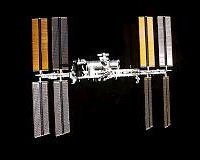 |
Washington DC (SPX) Jul 15, 2010 Most of us take it for granted today that American astronauts and Russian cosmonauts live and work together in Earth orbit. They've been doing it for years, first in the Shuttle-Mir program, and now on the International Space Station. But before the two Cold War-rivals first met in orbit in 1975, such a partnership seemed unlikely. Since Sputnik bleeped into orbit in 1957, the superpowers were driven by the Space Race, with the U.S. and then-Soviet Union driven more by competition than cooperation. When President Kennedy called for a manned moon landing in 1961, he spoke of "battle that is now going on around the world between freedom and tyranny" and referred to the "head start obtained by the Soviets with their large rocket engines." But by the mid-70s things had changed. The U.S. had "won" the race to the Moon, with six Apollo landings between 1969 and 1972. Both nations had launched space stations, the Russian Salyut and American Skylab. With the Space Shuttle still a few years off and the diplomatic chill thawing, the time was right for a joint mission. The Apollo-Soyuz Test Project would send NASA astronauts Tom Stafford, Deke Slayton and Vance Brand in an Apollo Command and Service Module to meet Russian cosmonauts Aleksey Leonov and Valeriy Kubasov in a Soyuz capsule. A jointly designed, U.S.-built docking module fulfilled the main technical goal of the mission, demonstrating that two dissimilar craft could dock in orbit. But the human side of the mission went far beyond that. The training leading up to the mission exposed the two crews to each other's nations, helping to break down cultural and language barriers. As Brand said in a 2000 interview, amid the Cold War tensions, "we thought they were pretty aggressive people and ... they probably thought we were monsters. So we very quickly broke through that, because when you deal with people that are in the same line of work as you are, and you're around them for a short time, why, you discover that, well, they're human beings." In a 1997 interview, Stafford described how they got around the language problem. "Each crew would speak his own language, and the other would have to understand," he said. It just wasn't working, until Stafford and the Russian backup commander had the idea to speak in the other's language. "So we started," he said, "and boy, it worked slick as a whistle."
'Hello, Darlin' A few hours later it was the crew members who were literally shaking hands, exchanging hugs and ceremonial gifts, including U.S., Soviet and United Nations flags, commemorative plaques, medallions, certificates and tree seeds. The crews received a congratulatory message from Soviet premier Leonid Brezhnev and a phone call from U.S. President Gerald Ford, who joked with astronaut Slayton about being the "world's oldest space rookie." The 51-year old Slayton had been one of the "Original Seven" Mercury astronauts, but was grounded due to a heart condition. Finally cleared to fly on Apollo-Soyuz, Slayton reported, "it's been a great experience. I don't think there's any way anybody can express how beautiful it is up here." Apollo Commander Stafford had another unique cultural exchange for the cosmonauts. He'd gotten country music star Conway Twitty to record "Privet Radost," a Russian version of his hit "Hello, Darlin'." About an hour before the two craft undocked, the song was played from orbit and heard all over the world. Mission Control quipped that it "sounded like it was from far Western Oklahoma, around Kiev." The Apollo crew returned to Earth on July 19, their Russian counterparts two days later. It would be two decades until the countries teamed up again with the Shuttle-Mir program, but the seed was planted. As Brand said, "I really believe that we were sort of an example ... to the countries. We were a little of a spark or a foot in the door that started better communications."
Share This Article With Planet Earth
Related Links Apollo-Soyuz Test Project Station at NASA Station and More at Roscosmos S.P. Korolev RSC Energia Watch NASA TV via Space.TV Space Station News at Space-Travel.Com
 NASA Selects Student Experiments For Space Station
NASA Selects Student Experiments For Space StationHouston TX (SPX) Jul 14, 2010 NASA has selected nine experiments, designed by students at seven schools, for astronauts to perform on the International Space Station this summer. NASA selected the proposals from among 132 received for the new Kids in Micro-g! Program. This is the pilot year for the program, a student experiment design challenge geared toward grades five through eight. Its purpose is to give students a ... read more |
|
| The content herein, unless otherwise known to be public domain, are Copyright 1995-2010 - SpaceDaily. AFP and UPI Wire Stories are copyright Agence France-Presse and United Press International. ESA Portal Reports are copyright European Space Agency. All NASA sourced material is public domain. Additional copyrights may apply in whole or part to other bona fide parties. Advertising does not imply endorsement,agreement or approval of any opinions, statements or information provided by SpaceDaily on any Web page published or hosted by SpaceDaily. Privacy Statement |